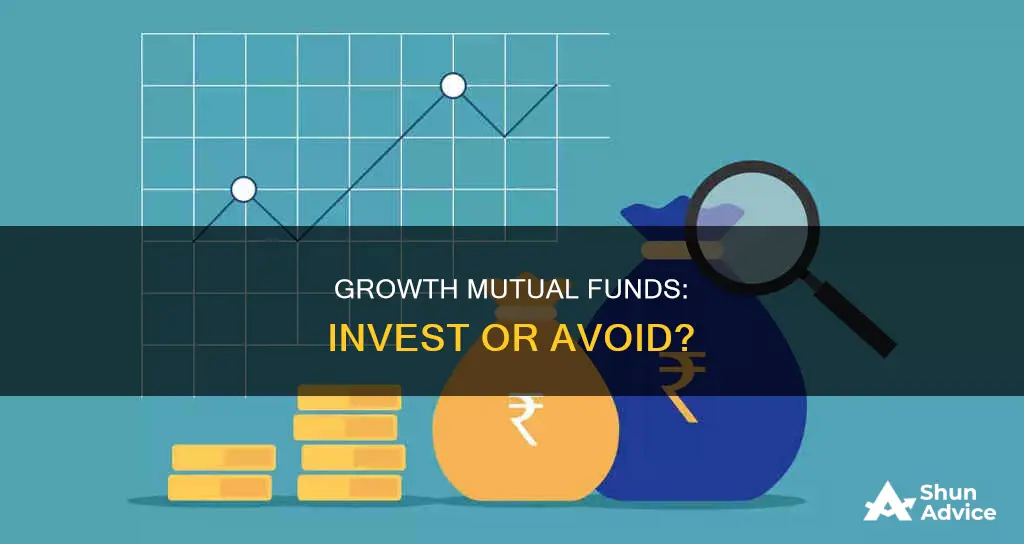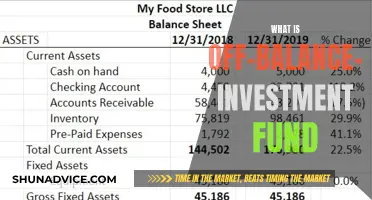
Investing in a growth mutual fund is a great way to diversify your portfolio and benefit from the expertise of professional fund managers. These funds focus on investing in companies with strong growth potential, aiming to deliver higher returns to investors. When considering investing in a growth mutual fund, it is essential to evaluate your risk tolerance, investment goals, and time horizon. Growth funds tend to carry more risk than value or income funds, but they also offer the potential for higher returns. It is also important to consider the fees associated with growth mutual funds, such as expense ratios and sales charges, as these can impact your overall investment returns. By investing in a growth mutual fund, you can gain exposure to a diversified portfolio of carefully selected growth stocks, but it is important to remember that there is always the possibility of losing money in any investment.
| Characteristics | Values |
|---|---|
| Risk | High |
| Returns | High |
| Investment Horizon | Long-term |
| Diversification | Yes |
| Management | Professional |
| Liquidity | High |
| Tax Implications | Deferment until shares are sold |
What You'll Learn

Growth funds vs. dividend reinvestment
When deciding between growth funds and dividend reinvestment, it is essential to understand your financial goals, risk tolerance, and tax situation. Both options have advantages and are aligned with different investment strategies and goals. Here is a comparison of the two:
Growth Funds
Growth funds are ideal for investors seeking capital appreciation and long-term growth. They invest in stocks of companies expected to grow faster than the overall market. These funds often have higher expense ratios due to the need for expertise and analysts to identify undervalued companies or those with strong growth potential. Growth funds tend to have more risk and fluctuations in stock prices but offer the potential for higher returns. They are usually better for investors with a longer investment horizon who can withstand short-term volatility.
Dividend Reinvestment
Dividend reinvestment is a strategy where dividends are used to purchase more shares in the fund, increasing your stake over time. This approach benefits from the power of compounding, as the reinvested dividends generate additional dividends, leading to exponential growth. Dividend-producing funds typically hold bonds, dividend-paying stocks, and other income-generating securities. Dividend reinvestment is often preferred by individual retirement account (IRA) holders to avoid early tax penalties on withdrawals.
Tax Implications
Growth funds and dividend reinvestment options have different tax implications. Growth funds are more likely to produce capital gains taxed at the time of redemption. Dividend reinvestment, on the other hand, is subject to taxation on dividends, which are taxed at the applicable income tax slab rate of the investor. Additionally, dividends above a certain amount may be subject to Tax Deducted at Source (TDS).
There is no universal answer to which option is better. If you are risk-averse, reinvesting dividends might be preferable as it offers more stability and predictability. On the other hand, if you are willing to take on more risk for potentially higher returns, growth funds may be more appealing. The choice depends on your risk tolerance, market outlook, and financial goals.
Retirement Mutual Funds: Where to Invest for a Secure Future
You may want to see also

Mutual funds and risk
Mutual funds are a popular investment vehicle, especially for retirement accounts. They are a type of investment fund that pools money from multiple investors to purchase a diversified portfolio of stocks, bonds, or other securities. The fund is then managed by a professional fund manager who decides how to divide the money across sectors, industries, companies, etc., based on the fund's strategy.
Risks of Mutual Funds
Mutual funds are subject to various risks that investors should be aware of:
- Market Risk: The value of the securities within the fund may decline, leading to a decrease in the fund's value.
- Interest Rate Risk: Rising interest rates can lead to a decrease in bond prices, affecting funds holding bonds and other fixed-income securities.
- Management Risk: Poor investment decisions by the fund manager will negatively impact the fund's returns.
- Cash Drag: Mutual funds typically hold a significant portion of their portfolio in cash to satisfy share redemptions, and this cash earns no return.
- Dilution: When a fund becomes too large, the manager may struggle to find suitable investments for all the capital, leading to reduced returns.
- Tax Risk: Selling a security within the fund can trigger a capital gains tax, which can be passed on to investors.
Risk Mitigation
While mutual funds carry risks, there are also ways to mitigate these risks:
- Diversification: Mutual funds provide instant diversification by investing in a collection of companies or industries, spreading the risk across multiple investments.
- Professional Management: Fund managers are legally obligated to act in the best interest of the fund's shareholders and have the expertise to navigate market risks.
- Regulation: Mutual funds are highly regulated, ensuring accountability and fairness for investors.
- Long-Term Investment Horizon: Holding mutual funds for the long term can help weather short-term volatility and market downturns.
- Due Diligence: Conducting thorough research on the fund's past performance, management team, fees, investment strategy, and size can help identify funds that are a good fit for your risk tolerance and investment goals.
A Beginner's Guide to Mutual Fund Investing with E-Trade
You may want to see also

Mutual funds and tax implications
Mutual funds are a popular investment vehicle, especially for retirement accounts like 401(k)s, as they offer a relatively hands-off way to invest in a diverse range of assets. However, it's important to be aware of the tax implications that come with investing in mutual funds. Here are some key points to consider:
Taxation of Mutual Fund Distributions
Mutual fund distributions occur when the fund company passes on earnings and other payouts to shareholders. These distributions are generally subject to differing tax rates. Most funds bundle these payouts into single, net distributions at the end of each year. It's your responsibility to report these transactions on your tax return and pay the appropriate taxes on each type of fund income.
Tax-Advantaged Accounts
If you hold mutual funds in certain types of accounts, such as individual retirement or college savings accounts, you may be eligible for tax advantages. In these cases, you typically pay taxes only when earnings or pre-tax contributions are withdrawn. This information is usually reported on Form 1099-R.
Taxation of Share Transactions
If you hold mutual fund shares in a taxable account, you are generally required to pay taxes on distributions, whether they are paid out in cash or reinvested in additional shares. Additionally, if you buy or sell shares within the mutual fund during the year, you must report these transactions on your tax return and pay taxes on any gains and dividends. Moving between mutual funds within the same company is also considered a taxable event.
Types of Distribution and Their Taxation
The type of distribution you receive from a mutual fund will impact how it is taxed. Long-term capital gains, resulting from the sale of shares held for more than a year, are typically taxed at lower rates than ordinary income. Short-term capital gains, on the other hand, are often treated as ordinary dividends and taxed at ordinary income tax rates. Dividends from common stock of domestic and qualifying foreign corporations are usually taxed as long-term capital gains. Ordinary or non-qualified dividends, which include investment income earned by the fund from interest and non-qualified dividends minus expenses, are taxed at ordinary income tax rates.
Timing of Fund Purchases and Sales
The timing of your fund purchases and sales relative to distributions can have a significant impact on your tax liability. If you buy shares just before a distribution occurs, you will be taxed on gains from shares throughout the entire year, even if you didn't own them for the full year. Selling a fund prior to a distribution will generally result in a lower tax liability compared to selling after the distribution.
Turnover Rate and Trading Fees
When choosing a mutual fund, consider the fund's turnover rate, which refers to how frequently the fund trades securities. Funds with high turnover rates may accumulate more taxable gains, and the associated trading fees can cut into net earnings.
Tax-Efficient Investment Strategies
To minimize your tax liability, consider investing in index funds, which tend to have lower turnover rates and generate fewer taxable gains and losses. You can also look for funds with low unrealized capital gains and avoid funds that are about to make large capital gains distributions. Additionally, consider investing in tax-free mutual funds, such as those that invest in government and municipal bonds, which offer tax-exempt interest.
Exchange Funds: Regulated Investment Company Status Explained
You may want to see also

Mutual funds and diversification
Mutual funds are a great way to achieve diversification in your investment portfolio. Diversification is a risk-reduction strategy that mixes investments and assets within a portfolio. By investing in a mutual fund, you gain exposure to a wide range of securities, such as stocks, bonds, or other assets, depending on the fund's strategy.
- Mutual funds pool money from multiple investors to purchase a diversified portfolio of securities. This allows individual investors to benefit from economies of scale and spread risk across multiple investments.
- Mutual funds are managed by professional fund managers who decide how to allocate money across different sectors, industries, and companies based on the fund's strategy.
- There are various types of mutual funds, including stock funds, bond funds, money market funds, and target-date funds. Each type has a different investment focus and risk profile. For example, stock funds can be further categorized into large-cap, mid-cap, or small-cap funds, depending on the market capitalization of the companies they invest in.
- When investing in mutual funds, it's essential to consider the fees associated with them, as these fees will impact your overall returns. Common fees include expense ratios, sales charges or loads, redemption fees, and account maintenance fees.
- Mutual funds offer instant diversification, making them attractive to investors who want a simple and affordable way to invest in a variety of assets.
- However, one potential drawback of mutual funds is that they may hold a significant portion of their portfolios in cash to satisfy daily redemptions, which can create a "cash drag" that reduces returns.
- When choosing a mutual fund, it's important to consider your investment goals, risk tolerance, and time horizon. Some funds are better suited for long-term investors, while others may be more appropriate for those seeking regular income.
- Growth mutual funds, in particular, tend to focus on stocks of companies expected to grow faster than the overall market. They often have higher expense ratios due to the expertise and research required to identify these companies.
- Growth funds also tend to have higher risk and potential for higher returns. They are usually better suited for investors with a longer investment horizon who can withstand short-term market volatility.
Strategies for Investing Like a Hedge Fund Manager
You may want to see also

Mutual funds and fees
Mutual funds charge fees, and it's important to understand what these are before investing. Here is a list of the most common fees:
Expense Ratio
An annual fee that covers the fund's operating expenses, including management fees, administrative costs, and marketing expenses. This is expressed as a percentage of the fund's average net assets and is deducted from the fund's returns. For example, a 1% expense ratio means you will be charged $10 for every $1000 invested.
Sales Charges or Loads
Some mutual funds charge sales fees, known as "loads", when you buy or sell shares. Front-end loads are charged when you buy, while back-end loads are assessed if you sell your shares before a certain date.
Redemption Fees
Some funds charge a redemption fee when you sell shares within a short period (usually 30-180 days) after purchasing them. This fee is designed to discourage short-term trading in these funds for stability.
Other Account Fees
Some funds or brokerage firms may charge extra for maintaining your account or transactions, especially if your balance falls below a certain minimum.
Mutual funds with higher expense ratios tend to be growth funds. This is because they require more expertise and analysts to find companies that are undervalued, have a track record of revenue growth, or have innovative products in the pipeline. However, it is worth noting that higher fees do not always equate to higher returns. When deciding between a growth fund and a dividend reinvestment fund, for example, it is important to consider all the fees and tax implications involved.
A Beginner's Guide to Mutual Fund Investing
You may want to see also
Frequently asked questions
Growth mutual funds focus on stocks of companies expected to grow faster than the overall market. They are popular with those looking for capital appreciation.
Growth mutual funds offer diversification and are suitable for investors with a long investment horizon. They are also suitable for investors with a high-risk tolerance seeking capital appreciation.
Growth funds tend to have more risk and are more likely to have fluctuations in their stock price. They also have higher expense ratios because of the expertise and analysts needed to find companies that are undervalued.







